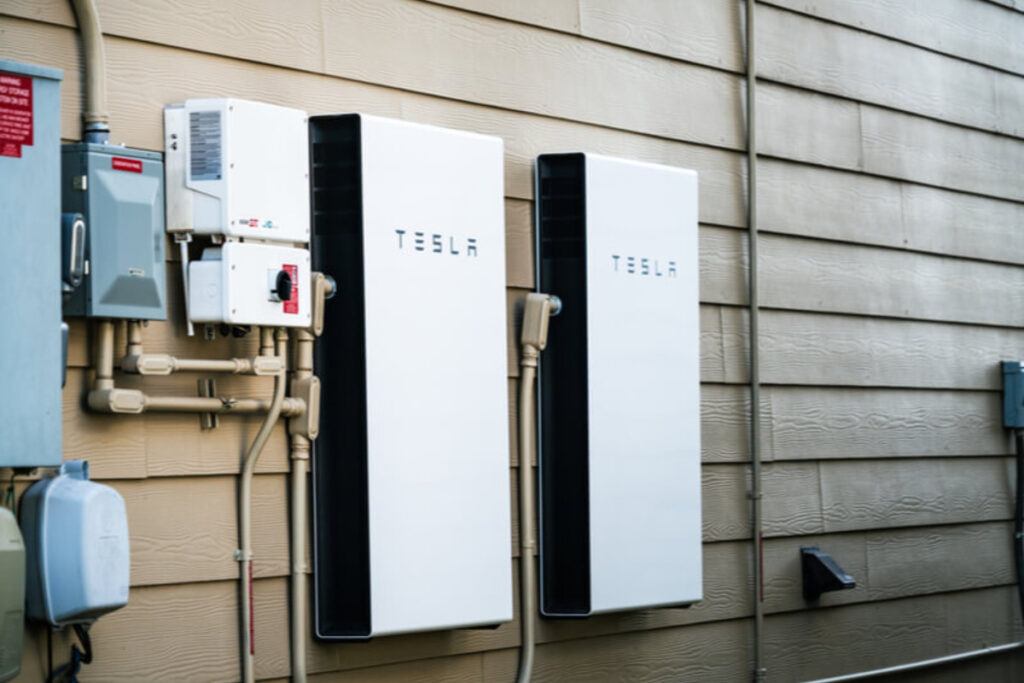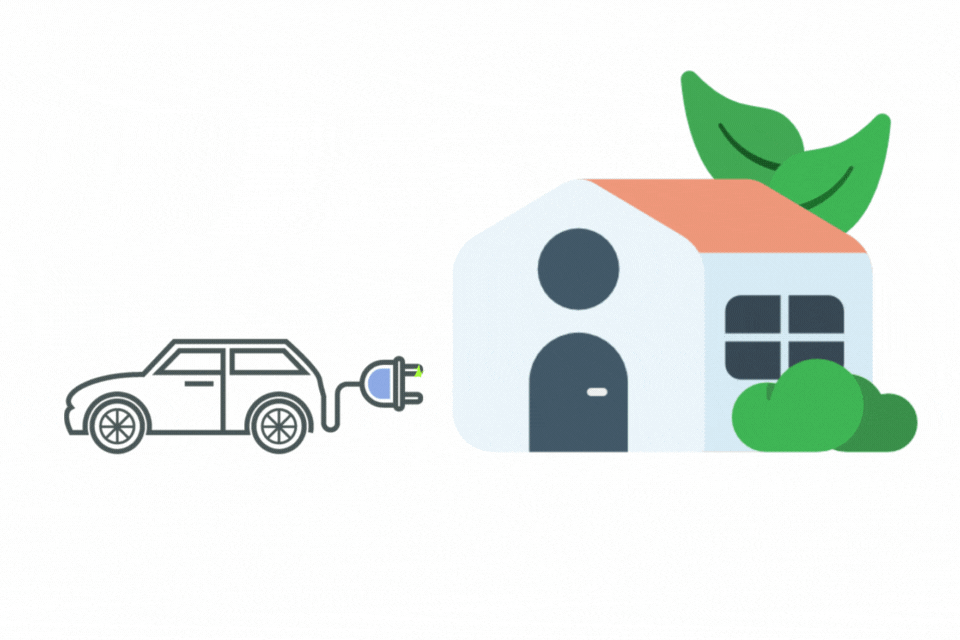Introduction
As the quest for sustainable living and renewable energy gains momentum, many homeowners are exploring alternative ways to power their homes. Enter electric vehicles (EVs) and home storage batteries – two contenders in this eco-friendly race.
But which one offers a better solution for powering your home? In this blog post, we’ll dive into the capabilities of EVs and home storage batteries. We will weigh their advantages and limitations while considering their cost, convenience, maintenance, and environmental impact.
| Key Takeaways |
|---|
| Both electric vehicles and home storage batteries offer unique solutions for powering your home, with advantages and limitations to consider when deciding. |
| Electric vehicles (EVs) are cost-effective, energy-efficient, and eco-friendly but have limited power capacity and portability. |
| Home storage batteries provide large power capacity, adaptability, and portability but come with a high cost and limited environmental friendliness. |
| Ultimately, the best choice between these options depends on individual circumstances such as household energy usage levels, overall cost considerations, convenience/maintenance factors, environmental impact concerns, and portability requirements. |
Comparing Electric Vehicles And Home Storage Batteries For Home Power Storage
When it comes to powering your home, you have two main options: electric vehicles (EVs) and home storage batteries; EVs are essentially “batteries on wheels” with the ability to store and deliver energy, while home storage batteries are stationary units that store large amounts of energy for household use.
Overview Of Electric Vehicles As Batteries On Wheels
Electric vehicles (EVs) are revolutionizing the way we think about energy storage and consumption, with their advanced battery technology offering a unique solution for powering homes.
These “batteries on wheels” store a significant amount of energy, allowing EV owners to tap into this resource during peak demand times or even in case of power outages.
Vehicle-to-home (V2H) charging technology enables using EV batteries as supplementary home energy sources. This innovative method allows bidirectional flow between the EV and your home’s electrical system, turning your electric vehicle into a mobile energy storage unit that can be dispatched when needed.
Features Of Home Storage Batteries
Home storage batteries are an efficient way to store energy for later use. These batteries come in different shapes and sizes, ranging from compact portable units to large wall-mounted systems.
The most common type of home storage battery is the lithium-ion battery, which can hold a high amount of power in a relatively small space.
Some popular features of home storage batteries include their ability to be charged with renewable sources such as solar power. When paired with rooftop solar panels or other renewable energy sources, users can store excess energy generated during the day for use at night or during periods of low sunlight.
Furthermore, many home storage batteries are adaptable and portable, allowing them to power homes even when off-grid or during unexpected outages.
Power Capacity And Storage
Electric vehicles (EV) and home storage batteries offer distinct advantages and limitations.
| Aspect | Electric Vehicles (EV) | Home Storage Batteries |
|---|---|---|
| Power Capacity | Approximately 60 kWh for an average EV, enough to provide back-up power to an average U.S. household for two days. | Scalable, varying capacities available depending on the needs of the homeowner. Can be expanded by adding more battery units. |
| Storage Duration | Theoretically, EV batteries can power a home for several days, depending on the size of the battery and household energy usage. | Can provide power for days, weeks, or as long as the battery capacity lasts, depending on battery size and household energy usage. |
| Compatibility with Renewable Energy Sources | Can be paired with renewable energy sources such as wind or solar to power homes, increasing energy efficiency and eco-friendliness. | Can be combined with solar panels or other renewable energy sources to store excess energy and provide a more sustainable power solution for homes. |
| Longevity and Replacement | EV batteries have a limited lifespan and may need replacement after several years, depending on usage. Cost and availability of replacement batteries should be considered. | Home storage batteries have a longer lifespan and can be more easily replaced or upgraded as needed. |
| Recycling and Environmental Impact | Recycling EV batteries is crucial for sustainable energy use, as they contain valuable materials that can be reused. However, recycling infrastructure is still developing. | Home storage batteries have similar recycling considerations, though recycling infrastructure for these batteries is more established. |
The table shows that electric vehicles and home storage batteries provide homeowners different power capacity levels and storage options. Ultimately, the decision should be based on household energy usage, overall cost, convenience, and environmental impact.
Advantages And Limitations Of Electric Vehicles For Home Power Storage
Electric vehicles offer a cost-effective, energy-efficient, and eco-friendly solution for home power storage, but their limited power capacity and portability can be a disadvantage.
Advantages: Cost-effective, Energy-efficient, And Eco-friendly
Electric Vehicles and Home Storage Batteries offer many advantages when powering your home. Here are some of the top benefits:
- Cost-effective: Using EVs or Home Storage Batteries as a backup power source can help reduce energy bills by using stored energy during peak hours and charging during off-peak hours. Additionally, EV batteries have a longer lifespan than traditional lead-acid batteries, making them a more cost-effective option in the long run.
- Energy-efficient: Electric vehicles and home storage batteries are highly energy-efficient, allowing homeowners to store energy efficiently when needed. With renewable energy sources like solar or wind power, homeowners can produce electricity without relying on the grid.
- Eco-friendly: EVs and Home Storage Batteries can significantly reduce carbon footprints by reducing reliance on fossil fuels and utilizing renewable energy sources. Recycling old batteries is crucial for sustainable energy use. It helps repurpose the materials used in batteries instead of throwing them away.
Choosing between Electric Vehicles and Home Storage Batteries depends on individual circumstances such as household energy usage levels, overall cost considerations, convenience/maintenance factors, environmental impact concerns, portability requirements, and more. However, both options offer significant benefits for those looking for an efficient and sustainable way to power their homes.
Disadvantages: Limited Power Capacity And Portability
Electric vehicles (EVs) have some drawbacks to be considered when using them for powering your home. These include:
- Limited Power Capacity: Although EV batteries hold a lot of energy, they may not be enough to power larger homes or during extended outages.
- Dependence on Vehicle Usage: To rely on the battery backup of an EV, it must be fully charged and not in use at the time of the outage. This can limit flexibility and reliability.
- Lack of Portability: Electric vehicles are not designed as portable power generators and cannot quickly move from one location to another.
- Costly Installation: Adapting an electric vehicle to function as a home battery requires an expensive setup that may include additional hardware, software, and expertise.
- Battery Life Expectancy: The lifespan of an EV battery is limited, typically about 8-10 years before requiring replacement.
- Environmental Concerns: Manufacturing and disposing of EV batteries can have negative environmental impacts if not handled responsibly.
Electric vehicles’ limitations in terms of capacity and portability make them not necessarily the best solution for all households. Even though they can provide backup power in emergencies.

Advantages And Limitations Of Home Storage Batteries For Powering Your Home
Home storage batteries have numerous advantages, including large power capacity, adaptability, and portability. However, high cost and lack of environmental friendliness are some limitations that must be considered.
Advantages: Large Power Capacity, Adaptable, And Portable
Home storage batteries have several advantages that make them suitable for powering your home. Here are some of the benefits of using home storage batteries:
- Large power capacity: Home storage batteries have a large capacity. It allows you to store enough energy to power your home during power outages or periods of high demand.
- Adaptable: Home storage batteries can be combined with renewable energy sources to provide clean, sustainable energy for your home.
- Portable: Home storage batteries can be moved around easily. They are ideal for use in off-grid living situations or areas prone to power outages.
- Energy resilience: With a home storage battery system, you can reduce your reliance on the power grid and achieve greater energy resilience for your home.
- Sustainable living: Home storage batteries allow you to live sustainably by reducing your carbon footprint and increasing your household’s use of renewable energy sources.
- Off-grid solutions: A home storage battery system can provide off-grid solutions for homes in remote areas without access to traditional energy sources.
Using a home storage battery allows you t enjoy large-scale power capacity, adaptability, portability, and an eco-friendly alternative energy source that reduces dependence on the traditional electricity grid.
Disadvantages: High Cost And Lack Of Environmental Friendliness
Home storage batteries come with a few disadvantages that must be considered before purchasing. Here are some of these drawbacks:
- High cost: Home storage batteries can be costly, especially compared to traditional energy sources.
- Limited environmental friendliness: Although home storage batteries reduce reliance on fossil fuels, they require materials that may harm the environment during manufacturing, recycling, and disposal.
- High maintenance: Keeping home storage batteries operational requires regular checks, maintenance, and occasional replacement, which can add to the overall cost.
- Not ideal for apartments or small dwellings: Home storage batteries may not be practical for people living in tiny homes or apartments due to their size.
- Lack of standardization: There are numerous different types of home storage batteries available today, and not all of them are compatible with every solar panel system or power grid.
- Low capacity for larger homes: There may be limitations to how much power can be stored in a single-home battery system for larger households with high electricity needs.
Although home storage batteries have disadvantages, improving technology makes them more efficient and affordable over time. Combining renewable energy sources like wind and solar power with EVs and using the latest energy-efficient technology can make our homes more sustainable while improving our energy resilience during blackouts or natural disasters.

Factors To Consider When Choosing Between EVs And Home Storage Batteries
Consider household energy usage, cost, maintenance, environmental impact, and portability when choosing between an EV and a home storage battery for powering your home.
Household Energy Usage
Assess your household energy usage before choosing between an electric vehicle and a home storage battery. Take note of how much power you consume on average and during peak periods.
A home storage battery is more suitable for households with high energy consumption. Because it has larger power capacities than EV batteries.
An average U.S. household can run off a Chevy Bolt‘s (66 kWh) or Nissan Leaf Plus‘s (62 kWh) charge. With bidirectional charging technology capability, they can run your house for at least two days.
Homeowners can reduce their reliance on nonrenewable resources and save on electricity bills by integrating renewable sources with hybrid vehicles that feature vehicle-to-home (V2H).
Overall Cost
The overall cost is key when deciding between electric vehicles and home storage batteries for powering your home. While EVs can be a backup power source, they still come at a high price point. On the other hand, traditional battery-powered home energy storage solutions cost less.
The upfront cost of purchasing an EV is significant. Meanwhile, investing in additional charging equipment required to enable V2H technology adds further expenses.
Compared to traditional electricity providers, lithium-ion batteries for home energy storage are more economical in the long run, despite their higher initial cost. State-specific incentives are also available to help offset installation costs for renewable energy systems.
Convenience And Maintenance
Convenience and maintenance are important factors when deciding between an electric vehicle or a home storage battery to power your home. Home storage batteries require less maintenance than EV batteries, which need regular charging and replacement over time.
However, bidirectional charging technology allows electric vehicles to function as backup power sources during emergencies. This eliminates the need for extensive installation and maintenance of additional equipment in your home.
Additionally, home storage batteries can be heavy and difficult to move around. At the same time, electric vehicles offer portability. They can easily be driven away from an area experiencing a power outage.
Environmental Impact
The environmental impact of powering your home with either electric vehicles or home storage batteries must be considered. Using renewable energy sources can significantly reduce carbon emissions associated with traditional forms of electricity production.
Home storage batteries are a good option for reducing reliance on fossil fuels and thus minimizing your carbon footprint.
On the other hand, EVs can also play a significant role in reducing carbon emissions in homes. They store excess renewable energy using batteries for later use when no sunlight or wind is available.
However, it’s important to consider the challenges of battery technology. This includes their lifespan, recyclability, and waste management when deciding between options.
Conclusion
In conclusion, electric vehicles and home storage batteries have advantages and limitations when powering your home. EVs are cost-effective and eco-friendly, but limited power capacity and portability can be limiting for some households.
On the other hand, home storage batteries provide large power capacity and adaptability but are expensive. When deciding between these options, consider your household energy usage, overall cost, maintenance convenience, environmental impact, and lifestyle preferences.
![]()
Go solar with DroneQuote
Make an informed decision for your home energy needs today. Choose a reliable partner like DroneQuote for your solar and roofing needs.
As you evaluate the advantages and limitations of electric vehicles and home storage batteries for powering your home, DroneQuote can provide expert advice tailored to your needs. DroneQuote’s honest and transparent approach can assist you in selecting the most suitable solar and roofing options for your home. This will provide a sustainable, cost-effective, eco-friendly energy source that fits your lifestyle. Contact us today to learn more.
FAQs
- How does an electric vehicle’s capacity compare to a home storage battery?
Electric vehicle batteries typically have larger capacities than home storage batteries, designed to power a car for long distances. On the other hand, home storage batteries store energy for smaller applications, such as powering household appliances or charging devices.
- Is it possible to use an electric vehicle battery to power my home?
Yes, using an electric vehicle battery to power your home is possible but it requires specific equipment and adjustments. To enable this, one must install a device that can convert the EV battery’s direct current into an alternating current suitable for household appliances.
- What are some advantages of using a home storage battery over an electric vehicle battery for powering my home?
Home storage batteries are optimized for stationary use. They also have a longer lifespan than regular EV batteries, making them more efficient and reliable for powering homes. These systems are also easier and cheaper to maintain and replace if anything goes wrong.
- Which cost-effective option is purchasing a dedicated home-storage system or using your EV’s existing battery?
Several factors affect whether Electric Vehicle (EV) Batteries or Home Storage Systems are cost-effective. This includes electricity rates, peak usage times, and solar panel size and location. However, the high installation costs and required upgrades for EV batteries make dedicated Home Storage Systems more affordable in terms of initial setup and maintenance expenses over time. It’s important to consider these factors before deciding which option suits your needs best.


